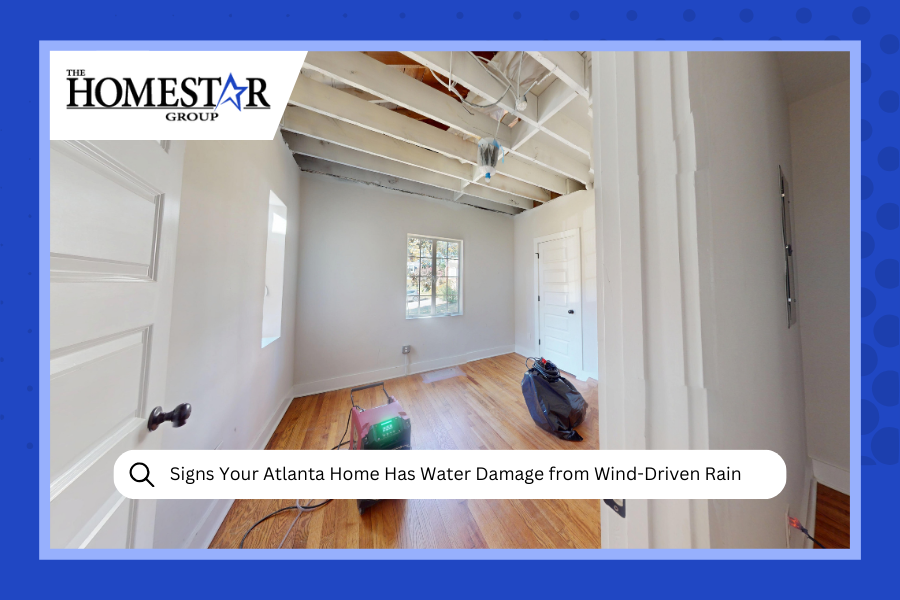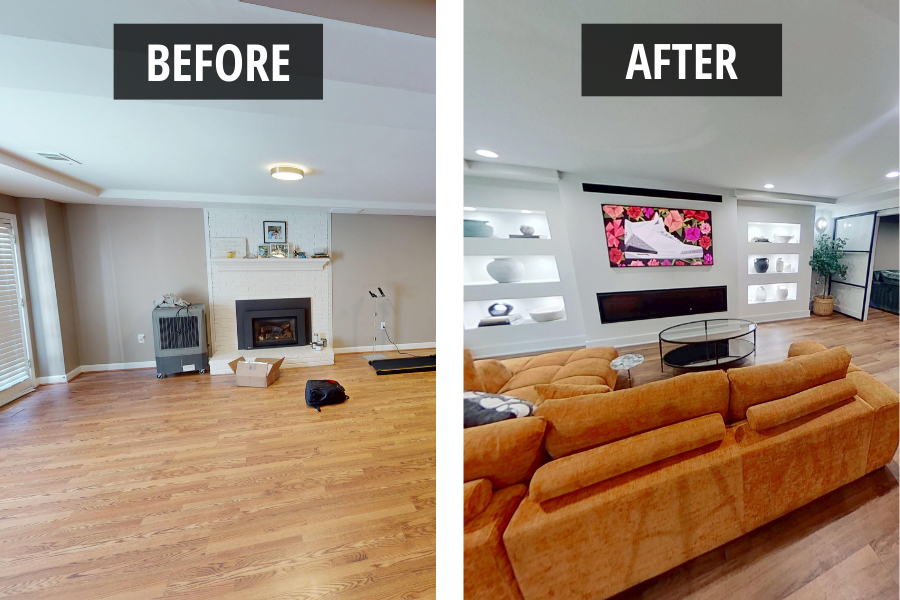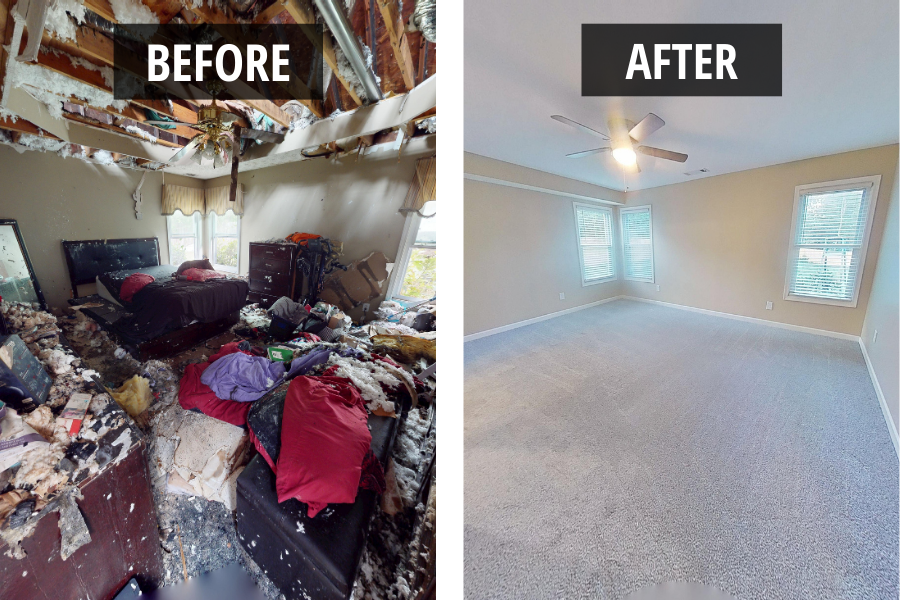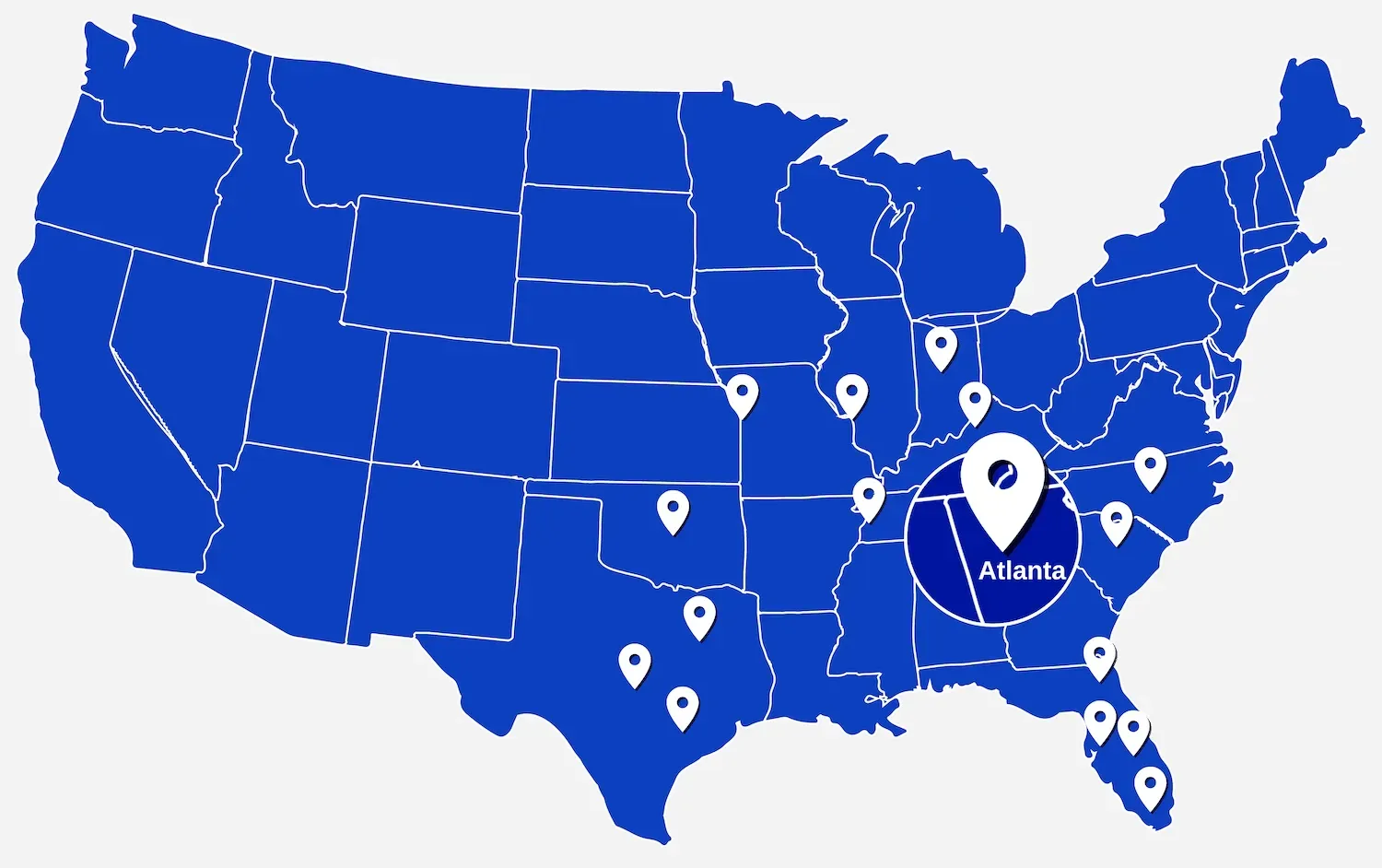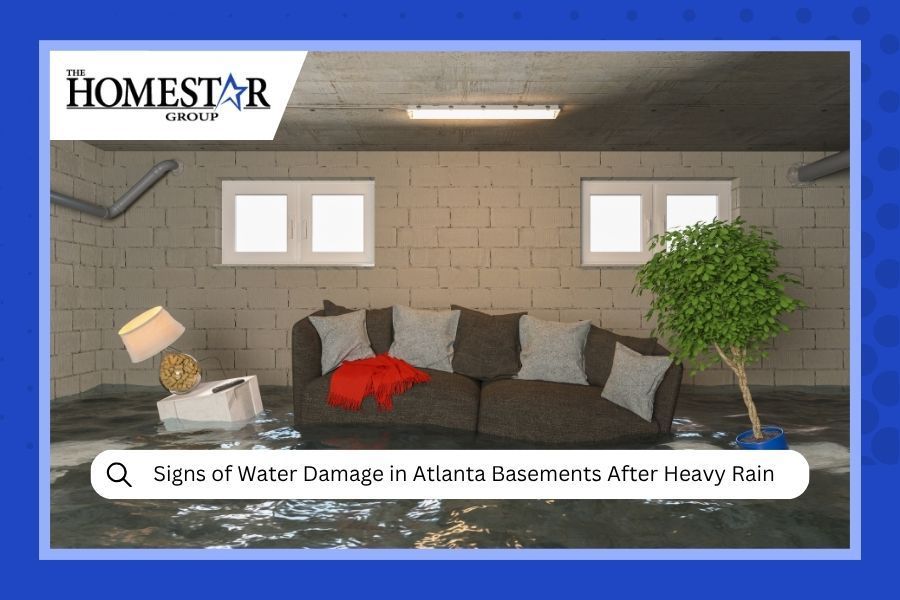
Signs of Water Damage in Atlanta Basements After Heavy Rain
Living in Atlanta means dealing with some pretty intense weather, and if you've got a basement, you know exactly what we're talking about. Those sudden downpours and flash floods that seem to come out of nowhere? Yeah, they can turn your basement into an unwanted swimming pool faster than you can say "Peachtree Street."
At The Homestar Group, we've seen it all over our 15+ years serving the Atlanta metro area. From Conyers to Marietta, from East Atlanta to Stone Mountain, we've helped countless homeowners deal with the aftermath of Georgia's unpredictable weather. Today, we want to share what we've learned about spotting the early signs of water damage in your basement, because catching it early can save you thousands of dollars and a whole lot of headaches.
Trust us, your basement will thank you for paying attention to these warning signs, and if you need professional water damage restoration , we're here 24/7 to help.
Why Atlanta Basements Are Particularly Vulnerable
Let's be real for a minute. Atlanta's weather can be a bit of a drama queen. One minute it's sunny, the next minute you're watching cars float down the street (okay, maybe that's a slight exaggeration, but you get the point). Our city sits in a unique spot where heavy rains, tropical storm remnants, and even the occasional tornado can dump serious amounts of water in a short time.
Unlike some places up north where basements are built with heavy-duty waterproofing because they expect snow and ice issues, many Atlanta area basements weren't necessarily designed with our specific flooding challenges in mind. Add to that our clay-heavy soil that doesn't drain as quickly as sandy soil, and you've got a recipe for potential water intrusion.
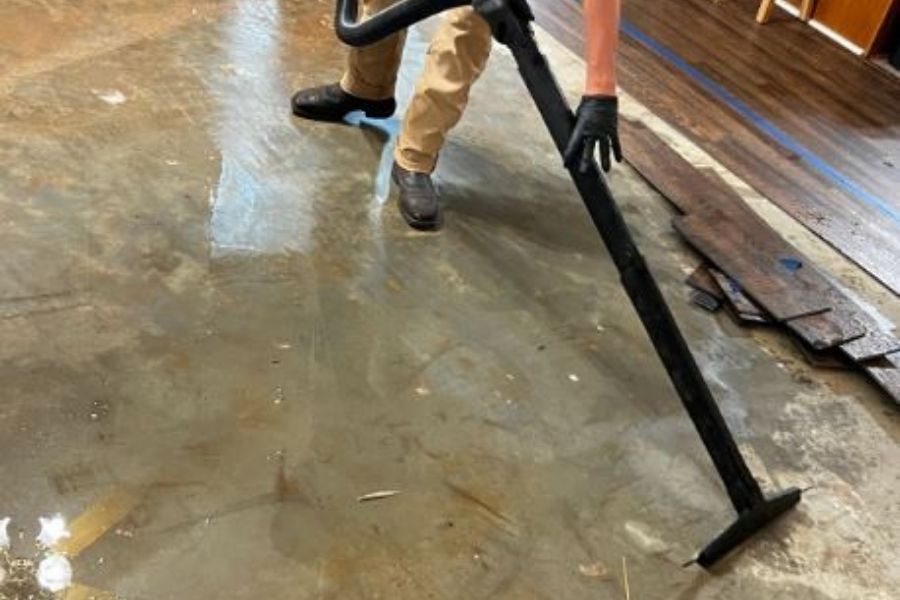
Standing water in basements is a common sight after Atlanta's heavy rains - catching early warning signs can help prevent this level of damage.
The Sneaky Signs Your Basement Has Water Damage
Visual Clues That Scream "We Have a Problem"
Water Stains and Discoloration
Those brownish, yellowish, or even greenish marks on your walls aren't abstract art, they're your basement's way of telling you water has been visiting when you weren't looking. These stains often appear near the foundation walls or around windows and can range from light discoloration to obvious streaks running down the wall.
Efflorescence (Those White, Chalky Deposits)
If you're seeing white, powdery stuff on your concrete or brick walls, that's efflorescence. It happens when water evaporates and leaves behind salt deposits. Think of it as your wall's way of crying salty tears.
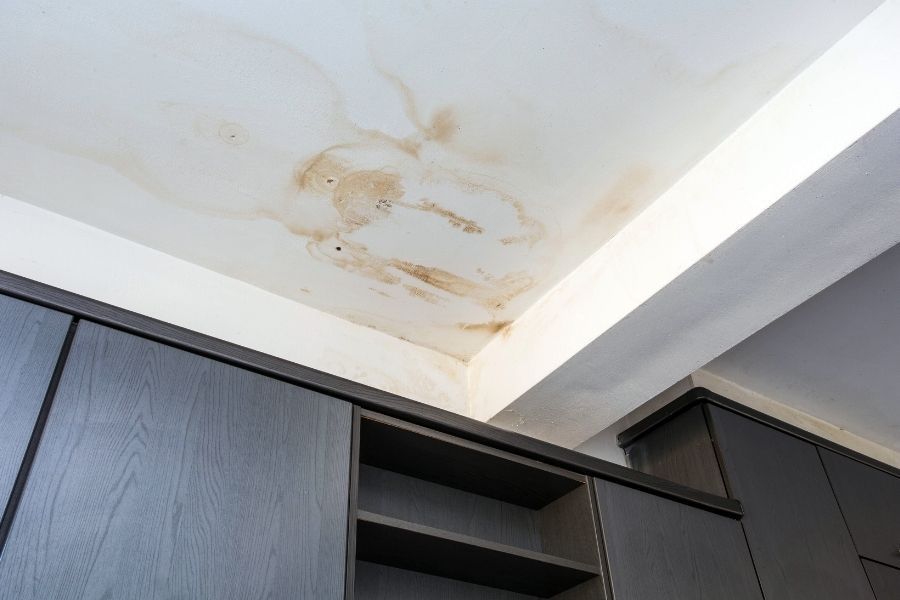
Water stains and discoloration like this are telltale signs of moisture intrusion that shouldn't be ignored in Atlanta basements.
Peeling Paint or Wallpaper
When moisture gets behind paint or wallpaper, it loses its grip faster than a smartphone in wet hands. If you're seeing bubbling, peeling, or curling, moisture is likely the culprit.
The Smell Test
Musty, Damp Odors
Your nose knows. That musty smell isn't just "basement character," it's often the first sign that moisture is building up somewhere. If your basement smells like an old gym sock, it's time to investigate.
Don't Wait for Small Problems to Become Big Disasters
Noticed any of these signs in your Atlanta area basement? Don't let water damage get worse. Our IIRC-certified team at The Homestar Group provides free estimates within 24 hours.
Contact Us TodayPhysical Changes You Can Feel
Increased Humidity
If your basement feels like a sauna in July (and it's not actually July), you might have excess moisture. Humidity levels above 60% can lead to mold growth and structural issues.
Warped or Buckled Flooring
Wood floors that look like they're doing the wave, or tiles that are lifting at the edges, are clear indicators that water has been infiltrating from below.
Basement Water Damage Checklist: What to Look For
Here's a practical checklist you can use during your next basement inspection:
| Area to Inspect | Signs to Look For |
|---|---|
| Foundation and Walls | Cracks in foundation walls (even hairline cracks matter), water stains or discoloration, white chalky deposits (efflorescence), peeling paint or loose wallpaper, damp or wet spots |
| Floors | Warped, buckled, or soft flooring, standing water or puddles, staining on concrete floors, carpet that feels damp or spongy |
| Air Quality | Musty, damp, or moldy odors, excessive humidity (feels sticky or clammy), condensation on windows or pipes |
| Structural Elements | Rust on metal fixtures or appliances, mold growth (black, green, or fuzzy spots), damaged or deteriorating insulation, sagging ceiling tiles |
The Hidden Dangers of Ignoring Basement Water Damage
We get it. Sometimes you see a little water stain and think, "I'll deal with that later." But here's the thing, water damage is like that friend who overstays their welcome, it just keeps getting worse until you address it head-on.
Mold can start growing within 24-48 hours of water exposure. Once it takes hold, you're not just dealing with water damage anymore, you're looking at potential mold removal and health concerns for your family. For severe structural damage, you might even need our reconstruction services to get your basement back to its original condition.
Structural damage is another big concern. Water can weaken wooden support beams, damage electrical systems, and even compromise your home's foundation. What starts as a small leak can turn into a major reconstruction project if left unchecked.
When to Call the Professionals
Sometimes, you can handle minor moisture issues with a dehumidifier and some elbow grease. But there are times when you need to call in the cavalry (that's us). Here's when you should pick up the phone:
- Standing water in your basement
- Visible mold growth
- Electrical outlets or fixtures that have been exposed to water
- Structural damage like sagging floors or walls
- Sewage backup (definitely not a DIY situation)
- Insurance claims that need professional documentation
Remember, we're available 24/7 because water damage doesn't wait for business hours. Whether it's 2 PM on a Tuesday or 2 AM on a Sunday, we're here to help Atlanta area homeowners get their lives back to normal.
Preventing Future Water Damage in Your Atlanta Basement
An ounce of prevention is worth a pound of cure, especially when it comes to water damage. Here are some steps you can take to protect your basement:
Keep your gutters clean and direct water away from your foundation. Make sure your downspouts extend at least 6 feet from your house. Check for and seal any cracks in your foundation walls. According to the EPA's guidelines on moisture control , maintaining proper drainage is crucial for preventing water intrusion. Consider installing a sump pump if you don't have one (though they're not as common here as they are up north).
For more detailed prevention strategies specific to Georgia's climate, check out our post on protecting your home during Atlanta's storm season.
Regular maintenance goes a long way. Walk through your basement monthly and look for any of the signs we've discussed. The sooner you catch a problem, the easier and less expensive it is to fix. For additional tips on what to do immediately after discovering water damage, read our guide on emergency water damage response.
If you're dealing with water damage right now and need immediate help, don't hesitate to contact our emergency response team. We're available 24/7 because water doesn't wait for convenient times.
Why Atlanta Homeowners Trust The Homestar Group
Over our 15+ years serving the Atlanta metro area, we've learned that every water damage situation is unique. From the historic homes in East Atlanta to the newer constructions in Rockdale County, each property has its own challenges and needs.
Our IIRC-certified technicians understand Georgia's climate, soil conditions, and building characteristics. We know which problems are common in different neighborhoods and how to address them effectively. Plus, we handle insurance claims directly, so you don't have to navigate that maze alone.
We're not just another restoration company, we're your neighbors. We live in this community, understand its challenges, and are committed to helping fellow Atlantans protect their homes and families. Learn more about why Atlanta homeowners choose us for their restoration needs.
Frequently Asked Questions
Q: What's the difference between water stains and efflorescence on my Atlanta basement walls?
A: Water stains typically appear as brown, yellow, or dark discoloration and indicate where water has actually penetrated and dried. Efflorescence shows up as white, chalky deposits and occurs when water evaporates, leaving behind mineral salts. Both indicate moisture problems, but efflorescence specifically tells you that water is moving through your foundation walls from the outside.
Q: How can I tell if that musty smell in my basement is just "normal basement odor" or a sign of water damage?
A: Normal basements might have a slightly earthy smell, but musty, moldy, or sour odors are red flags. If the smell gets stronger after Atlanta's heavy rains or if you notice it's concentrated in certain areas of your basement, you likely have moisture infiltration. The smell often appears before you can see visible signs of water damage.
Q: My basement floor feels damp but I don't see standing water. Should I be concerned about this in Atlanta's humid climate?
A: Absolutely. Damp floors often indicate moisture wicking up through your concrete slab or infiltrating through foundation walls. In Atlanta's humid climate, this creates perfect conditions for mold growth and can lead to flooring damage. Even without visible water, persistent dampness suggests an ongoing moisture problem that needs professional assessment.
Q: After heavy rains in Atlanta, how long should I wait before checking my basement for water damage signs?
A: Check your basement during and immediately after heavy rains for obvious issues like standing water or active leaks. However, some signs like efflorescence, musty odors, or minor staining may take 24-48 hours to become noticeable. We recommend doing a thorough inspection within 2-3 days after any significant rainfall or flooding in the Atlanta area.

Jeremy York is the owner of The Homestar Group, bringing over 15 years of experience in the water and fire damage restoration industry to homeowners and businesses throughout the Atlanta metro area. Under his leadership, The Homestar Group has built a reputation for reliable 24/7 emergency response and professional restoration services backed by IICRC certification. Jeremy is committed to serving the local community and takes pride in helping families and business owners recover from unexpected disasters. His hands-on approach ensures every customer receives the care and attention they deserve during challenging times.

